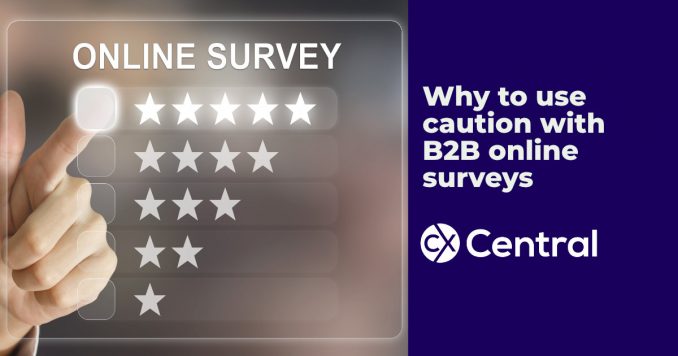
The danger of using B2B Online Surveys
With customer experience increasingly being acknowledged as a key battleground for companies moving forward, it is admirable that many companies are looking to roll out Voice of the Customer or Customer Insight programs.
As part of these programs, most companies are seeking to understand their customer’s views and opinions in more detail, through surveys, interviews, focus groups and observations.
Whilst these efforts should be applauded, a word of caution is also advised in rolling out such programs and determining the best ways to gather customer feedback, especially for those businesses who sell to other businesses, that is, those in the B2B space.
Before determining the best way to roll out such a program in any company, it is important to consider the key drivers of success in the market.
These drivers will help determine the best way to solicit feedback from customers and is where B2B business need to be very careful.
A word of caution with B2B online surveys
In B2B situations, and especially those in which long buying cycles and multiple interactions / conversations are involved, the personal relationships created between the selling and buying companies can often be a very important determining factor in whether the sellers are even given the opportunity to compete for a sale (e.g. through a tender), and in ultimately deciding successful sales.
These very important relationships are generally nurtured and cultivated through careful account management and similar activities undertaken by sales teams in the company attempting to make the sale, and can often take a fair bit of time to develop.
Thus, the human to human interface in these types of situations is critical.
This focus on relationships is why careful consideration needs to be given in determining the best way to gather feedback in B2B situations, and why online methods for gathering feedback in these situations should be avoided.
Specifically, whilst gathering feedback through online surveys is becoming more and more prevalent in all markets due to its low cost and potentially wide reach, in high-touch and relationship-focussed B2B situations using an online approach to feedback can be very detrimental for a range of reasons as listed below.
5 Reasons how B2B online surveys can be damaging
1. Impersonal
Online surveys can be seen as very impersonal by those who receive the invites to complete them.
In a situation where relationships have been cultivated with key stakeholders in a company, sending them an online invite to complete a survey can make them feel that they are not valued enough to obtain feedback through other methods
2. Limited Response Rates
Unfortunately, online surveys suffer from very low response rates (typically 5% or less), which means that only 1 in 20 or so of the people targeted will respond.
In a B2B situation where there can be a limited number of target respondents already, this is a big problem.
3. Untargeted
When gathering feedback from B2B customers, it is important that key decision makers respond and provide the feedback required to understand their needs, wants and views.
Unfortunately, whilst online surveys can be sent to specific people, they cannot be targeted as well as other methods, especially in terms of follow-up and promoting to complete the surveys.
4. Oversaturation
With the prevalence of online surveys increasing every day, people are tending to become more and more reluctant to complete these surveys given how many they receive.
If you keep in mind that any decision maker in a company is also a consumer and thus will be receiving a large number of online surveys, you can see why this over-saturation of the market will be a deterrent for them to complete any survey they receive, including one from one of their vendors.
5. Shallow
Given the structured nature of online surveys, they can really only scratch the surface to find out what respondents think about the company, product or service they are being asked about.
Whilst good survey design can focus on specific areas of interest, the online format does not allow the focus of the questions being asked to change too much based on responses from the person completing the survey (this type of deep dive relies on the person designing the survey identifying all possible answers and then creating questions to deep dive into all of them – a very hard task).
Other formats are much more flexible in allowing deep dives as required.
A solution for effective feedback in a B2B setting
Given the above, instead of using online surveys to gather feedback, whenever I work with relationship-focussed B2B companies, I recommend they use interviews to obtain the insights they need into what their clients are thinking.
Generally, these interviews don’t have to be long (15 mins is sufficient in most cases) and can be done over the phone or face to face. These types of interviews, as long as they are well designed and implemented can:
- target the right people
- obtain the right insights
- deep dive into specific responses
- gain a much higher response rate than online surveys
- improve relationships with customers, rather than destroy them
If you are working in a relationship-focused business, I urge you to strongly consider whether online surveys are the right approach, or whether an interview format would be a better way to gather customer feedback.
It almost always will be.
Get help implementing B2B online surveys or engage an expert in obtaining customer feedback. You’ll find a list of solution providers in our CX Directory.


Be the first to comment